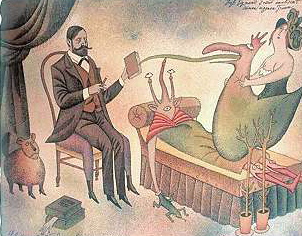Christian Nash
Philosophy 1030
Dr. Oliver
Installment #2
Sigmund Freud and
Consciousness
To
understand how the conscious and unconscious coexist, a common example is to
look at a Freudian slip. A Freudian slip is involuntarily substituting
words that reveal deeper, repressed feelings you are not trying to talk about (“Freudian”).
According to Freud’s psychoanalytic view, it was not just a slip up in words,
but your unconscious mind, forces outside of your awareness, directing your
behavior. Freud’s work was controversial among psychologists
and philosophers. It “provoked a
denial from philosophers for whom consciousness and mental were identical and
they could never conceive of an absurdity such as an unconscious mental state”
(Sousa). He believed that although you are unable to reach your unconscious
mind, your repressed feelings may come up in dreams or slip ups of words
(Kendra). However, without Freud’s work, there may not have been major
philosophical developments made, for example in William James’, The Principles of Psychology, he uses
the idea of “unconscious mentality” to support his theories that hold mental
states as “empirically analyzable compounds” (Sousa).
Freud chose
to use the idea of an iceberg because your conscious and preconscious mind are
just the tip of awareness. Your unconscious mind is your “awareness below the
surface.” Using this metaphor, the preconscious and conscious mind are the tip.
The conscious mind is used to read words on paper, and the preconscious mind is
used recall memories, things not currently in the conscious mind, but
retrievable. That leaves the unconscious mind to be responsible for the
underlying information such as, “memories,
thoughts, feelings, and information that is too painful, embarrassing,
shameful, or distressing for conscious awareness,” (Kendra). Freud’s argument
was that although you could not reach your unconscious mind, it still played a
role in your conscious decision making.
Freud believed that every choice you
make is in some way motivated by your unconscious, and to live in society, you
must repress certain urges and impulses. These impulses could not go unnoticed,
so Freud suggested that they resurface in disguised forms, such as dreams. While
conscious, “the impulses and desires of the id are
suppressed by the superego. Through
dreams, you are able to get a glimpse into your unconscious or the id. Because your guards are down during the dream state, your
unconscious has the opportunity to act out and express the hidden desires of
the id” (“Sigmund”). According to Freud, your desires could sometimes too
disturbing, possibly psychologically harmful, that your mind censors these
ideas and represents them symbolically, and the reason you have trouble remembering
your dreams is because your superego is protecting you from your unconscious
mind at work. “Freud is particularly preoccupied with sexual content in dreams.
He believes that sex is the root cause of what occurs in your
dreams. According to Freud, every long slender or elongated object (i.e.
knife, cigar, gun, etc) represents the phallus, while any cavity or receptacle
(bowl, cave, tunnel, etc) denotes the female genitalia” (“Sigmund”).
Works cited:
“Freudian Slip.” TV Tropes,
tvtropes.org/pmwiki/pmwiki.php/Main/FreudianSlip.
Kendra
Cherry | Reviewed by Steven Gans, MD. “What Are Freud's 3 Levels of Mind?”Verywell,
www.verywell.com/the-conscious-and-unconscious-mind-2795946.
“Sigmund Freud.” Dream
Moods: Dream Theories: Sigmund Freud, 2 June 2014,
www.dreammoods.com/dreaminformation/dreamtheory/freud.htm.
Sousa, Avinash De. “Freudian Theory and Consciousness: A
Conceptual Analysis**.” Mens Sana Monographs, Medknow Publications,
2011, www.ncbi.nlm.nih.gov/pmc/articles/PMC3115290/.
Installment #1:
Comment 1:
https://cophilosophy.blogspot.com/2017/12/our-sexual-desires-leading-to.html?showComment=1513099002960#c2584912899598481405
https://cophilosophy.blogspot.com/2017/12/our-sexual-desires-leading-to.html?showComment=1513099002960#c2584912899598481405
Comment 2:
https://cophilosophy.blogspot.com/2017/12/pt-2-why-is-current-music-so.html?showComment=1513095445562#c3040646526191580686



No comments:
Post a Comment
Note: Only a member of this blog may post a comment.